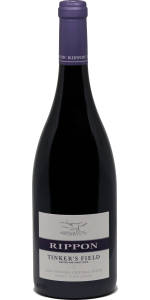
Description
Tinker’s Field is a distinct, north-facing parcel at the heart of Rippon where vine roots reach into pure schist gravels. Its fruit was hand harvested from mature, biodynamically grown vines, naturally fermented, cellared in barrel for two winters and then run directly into bottle without filtering or fining. Further cellaring at a cool, constant temperature and decanting is recommended.
Awards
99 pts James Suckling
94 pts The Wine Advocate Points
Certifications
Alcohol
13.5%
Analytical data
dry
Vineyard
Rippon aims to foster products that are a true and accurate reflection of their site; climate, aspect, culture and soils.
With their ability to metabolise minerals from the soil and release soluble exudates available to plants, it is the microflora of the soil which allows the vine to be receptive and reflective of the site. Our true craft therefore is to work the land in such a way as to maintain a healthy, natural and living soil.
When making operational decisions on the land, we seek to consider what effect our actions with have on soil biota. Whilst with farming it is impossible to allow the land to carry out all its natural processes (our farming aspirations are ultimately in conflict with the land’s natural state), many compromises are be made.
At Rippon, we work to achieve our goals as winegrowers in constant consideration of what the land itself might seek to gain from us in return. We believe this relationship allows Rippon (the place) to carry out enough of its own natural processes so as to continue expressing itself as an individual – and through the products it issues.
The indices considered when making operational, soil management related decisions may include:
Physical: altitude, ultra-violet light, wind, water (rainfall, soil-retention, irrigation) Mechanical: cultivation, compaction, Cultural: finance, staff availability, health & motivation Astral: lunar, planetary, seasonal & daily rhythms
The frequency, timing and tasks of all staff are carefully considered with regards to the above decision-making indices.
No synthetic fertilizers, herbicides, fungicides, pesticides or other chemicals that may contribute to soil degradation are used.
Vinification
Hand picked into small bins, the Pinot Noir is passed along an assessment table where fruit, seeds and stems are tasted. If stems are ripe and can be digested with no astringency, they will be used.
Fermented by Rippon's indigenous yeast population in 2 tonne fermenters with a cuvaison of 14-28 days depending on parcel
Maturation
11 months with a portion of new oak before a second winter in neutral oak. Run into bottle with no filtering or fining


